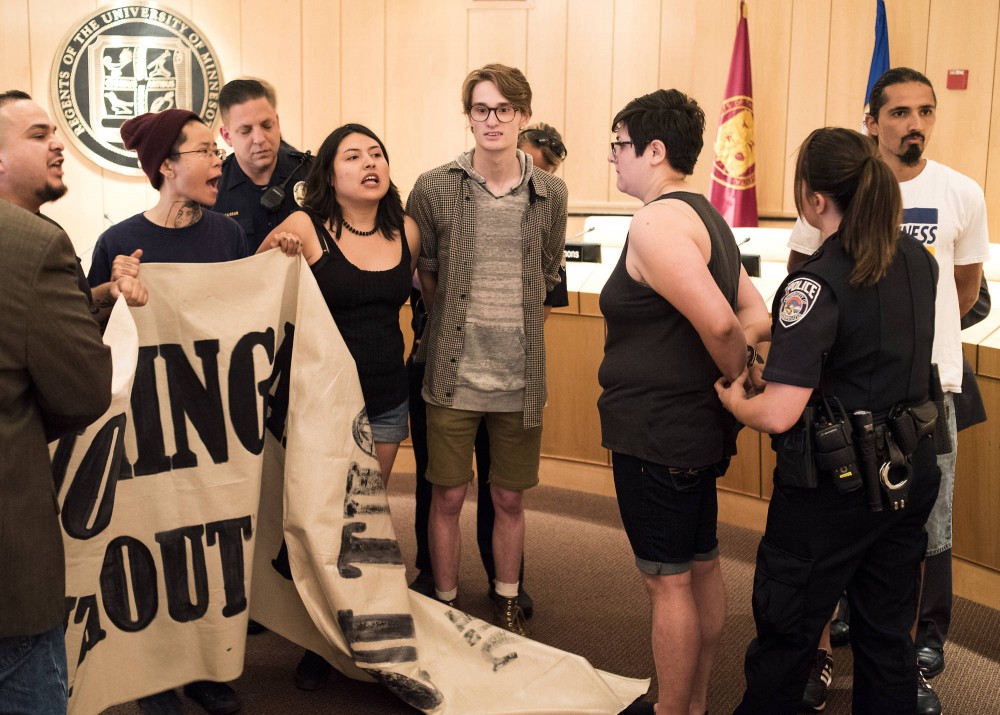Six University of Minnesota students were arrested during a protest over proposed tuition increases at a Board of Regents meeting last week.
Nearly 30 demonstrators attended the meeting to protest the Twin Cities campus tuition hikes included in University President Eric Kaler’s 2017 operating budget.
“We were hoping to … potentially prevent the tuition hikes vote from happening, but more than that we wanted to show the administration that we’re there and we’re watching … and that their intentions do not reflect us and reflect what we need,” said Alaina DeSalvo, a student in the College of Education and Human Development and one of the six arrested Friday.
In the end, the demonstrators failed to persuade regents to reject Kaler’s proposed budget.
The board approved the $3.6 billion budget proposal by a 10-2 vote on Friday. The plan includes a 2.5 percent tuition increase for resident or reciprocity undergraduates and a 7.5 percent increase for nonresident, nonreciprocity undergraduates — a decrease from Kaler’s original 9.9 percent increase proposal. The scaled-back increase comes after opposition from students over Kaler’s initial recommendation.
The increases will be abated for students whose families make up to $120,000 a year, which will impact about 10,000 students, according to the University.
The other five arrested students were Irina Barrera, 27, Max Franz, 20, Melinda Lee, 26, Rahsaan Mahadeo, 34 and Jose Santillana Jr., 32.
DeSalvo said she was disappointed about the arrests.
“We’re more likely to see a criminal record than our degree,” she said. “It’s just really disappointing and really sad that we all have misdemeanors on our record right now.”
Many of the protesters who demonstrated at the meeting were members of a coalition called Differences Organized, which is made up of about 15 different student organizations, including Whose Diversity?, said coalition organizer Joanna Nunez.
“This administration has failed to listen to students multiple times,” said Nunez, a 28-year-old doctoral student in feminist studies and a Whose Diversity? member. “We don’t feel like it’s okay for this University to try [to] fund itself on the backs of both out-of-state students and … local communities.”
University Spanish senior teaching specialist Mary Pogatshnik, who participated in the protests, said the tuition hikes would burden students who are already overworked as a result of funding their education.
“My problem with this is watching students fall asleep in my class, not being able to come to my class, not being able to enjoy my class because they just worked a double shift,” she said. “It’s too much to ask of our undergraduates to assume the fiscal and mental … un-health because of this.”
The protests began at the beginning of the Board’s meeting and lasted about fifteen minutes before six of the demonstrators were arrested. The rest of the protestors were warned to leave the building by University of Minnesota Police Department officers.
The students were cited for unlawful assembly and released, according to a police report.
DeSalvo said she and the others who were arrested may contest the charges in court.
“We’re going to gather as a group and decide how we want to proceed with this,” she said.
While Matt Sumera, director of communications for the University’s Office of Student Affairs, declined to say whether disciplinary actions would be carried out by the University, it appears that the arrested students could have committed at least three punishable offenses — refusal toiIdentify and comply, disorderly conduct and disruptive behavior — under the Board’s Student Conduct Code.
“There’s nothing we, as an office, can really say about these issues,” he said. “All student conduct cases are protected by [the Family Educational Rights and Privacy Act], and the University is not allowed to speak about them.”
Board Chair Dean Johnson said he was advised by UMPD Chief Matt Clark to give the protesters 10 to 15 minutes to demonstrate before warning them they would be arrested if they failed to leave.
“They have every right to protest,” he said. “I don’t like to arrest people because of free speech, but having said that, we needed to talk about the budget, the capital projects issue and a whole series of other business. … This is one of our most important meetings that we have in the year.”
Some regents, including those who voted for the tuition increase, acknowledged the concerns of the protesters.
“This is real from them,” said Regent Abdul Omari. “Whether we agree with the means by which we saw actions take place … we also represent [those] students.”
Kaler said he was disappointed with the protests, adding that the University works hard to address students’ concerns.
“We work hard with a variety of things around campus climate,” he said. “I listen to student voices across the spectrum. I respect their point of view, but when you protest a tuition increase that’s reserved only for families, that feels that we’re not representing the fact that we’ve frozen tuition … for low and mostly middle-income [students].”


